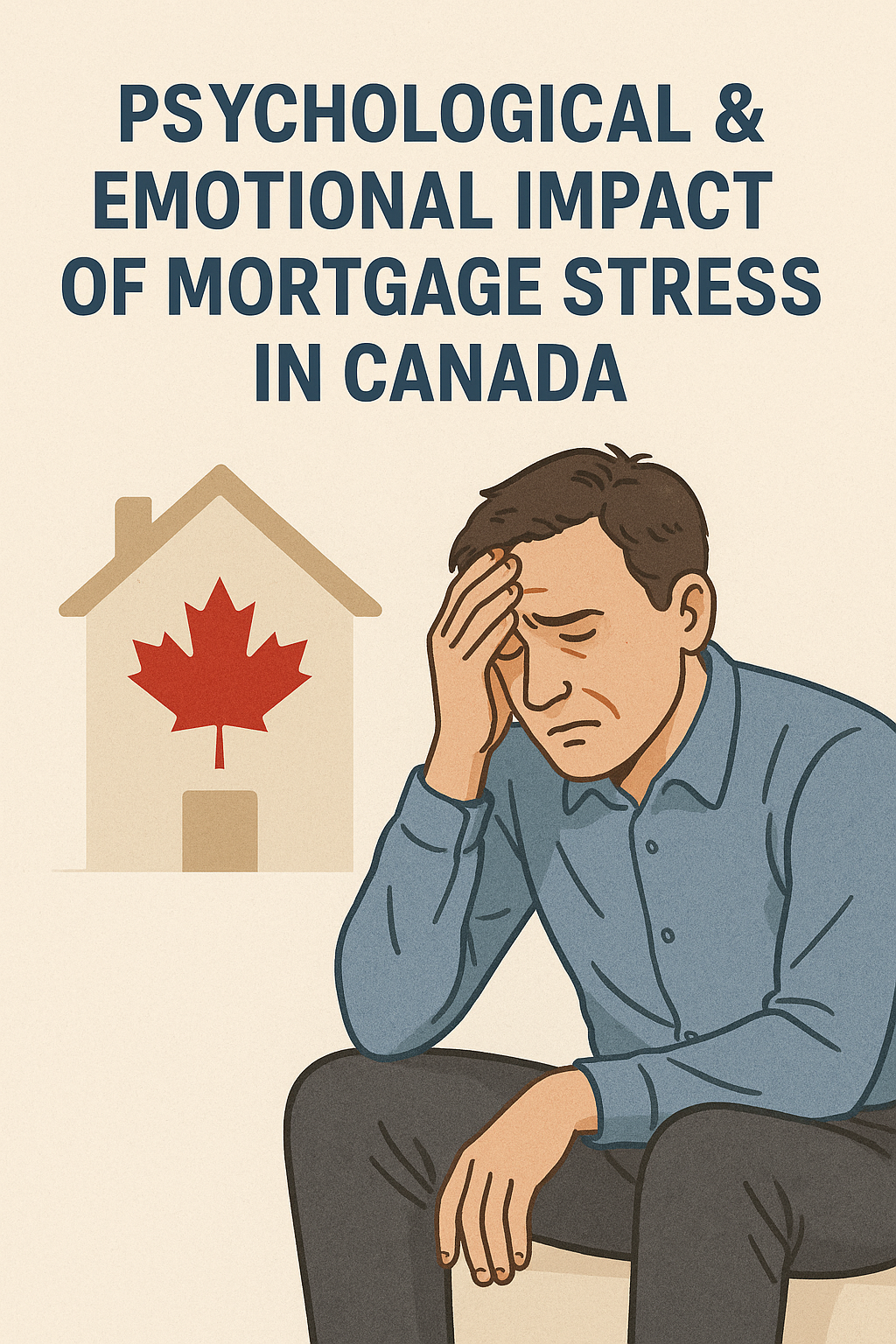Table of Contents
ToggleThe Hidden Burden: The Psychological & Emotional Impact of Mortgage Stress in Canada
For many Canadians, homeownership represents stability, security, and achievement. But when mortgage payments become overwhelming, that dream can quickly turn into a source of stress, anxiety, and even despair. Mortgage stress—the financial and emotional pressure caused by rising payments, higher interest rates, or unmanageable debt—is becoming increasingly common across Canada.
In this article, we’ll explore the psychological and emotional toll of mortgage stress, why it matters, and what steps homeowners can take to protect both their financial well-being and their mental health.
What Is Mortgage Stress?
Mortgage stress happens when homeowners struggle to meet their monthly payments or worry about future affordability. It often arises due to:
-
Rising interest rates at renewal
-
Increased household expenses (utilities, groceries, childcare)
-
Job loss or reduced income
-
Carrying too much high-interest debt
-
Unexpected life events (divorce, illness, or emergency expenses)
While the financial aspects are obvious, what’s often overlooked is the emotional cost. The stress doesn’t just hit your wallet—it impacts your relationships, your health, and your quality of life.
The Psychological Toll of Mortgage Stress
1. Anxiety and Constant Worry
One of the most immediate effects of mortgage stress is heightened anxiety. Many homeowners find themselves lying awake at night worrying about bills, the possibility of foreclosure, or how to provide for their family. This ongoing anxiety can lead to irritability, poor focus, and even panic attacks.
2. Depression and Hopelessness
When debt feels unmanageable, it can create a sense of hopelessness. The thought of losing a home—something tied so deeply to identity and stability—can cause feelings of failure or shame. Over time, these emotions may lead to depression if not addressed.
3. Strain on Relationships
Financial struggles are one of the leading causes of relationship breakdowns. Couples experiencing mortgage stress may argue more frequently, withdraw from one another, or struggle with intimacy due to constant financial pressure.
4. Impact on Work and Productivity
Mortgage stress doesn’t stay at home—it often follows people into the workplace. Worrying about finances can reduce productivity, increase mistakes, and even lead to absenteeism due to stress-related illnesses.
5. Physical Health Problems
Stress manifests physically. Homeowners dealing with mortgage pressure may experience headaches, insomnia, digestive problems, high blood pressure, or a weakened immune system. Over time, chronic stress can contribute to serious health conditions.
How Mortgage Stress Affects Families
Mortgage stress isn’t limited to the individual borrower—it ripples through the household. Children can sense tension at home, and they may feel anxious about the family’s financial security. Parents under pressure may also cut back on extracurricular activities, vacations, or other family experiences, creating further emotional strain.
In multigenerational households, seniors may feel guilty if they are financially dependent on their children, while younger adults may delay life milestones such as marriage, children, or education because of the family’s financial challenges.
Why Talking About Mortgage Stress Matters
In Canada, discussions about mortgages often focus only on numbers: interest rates, amortization schedules, or loan-to-value ratios. While these are important, the emotional side of borrowing is rarely discussed.
By bringing attention to the psychological impact of mortgage stress, Canadians can:
-
Recognize that they are not alone in their struggles.
-
Seek support earlier—before stress escalates into a crisis.
-
Make informed financial decisions that consider both money and mental health.
Practical Strategies to Manage Mortgage Stress
Mortgage stress is real—but it’s also manageable. Here are proven strategies that can help homeowners regain control.
1. Refinance or Consolidate Debt
If monthly payments are too high, refinancing your mortgage or consolidating high-interest debt into a single lower-rate loan can free up cash flow. For example, working with a mortgage broker like LendToday.ca can help identify refinancing options even for homeowners with credit challenges.
2. Explore Alternative Lenders
Traditional banks may not always provide flexible solutions. Private lenders or mortgage investment corporations (MICs) can sometimes offer short-term relief or bridge financing when mainstream lenders decline.
3. Create a Realistic Budget
A detailed budget is essential. Track all income and expenses, and identify areas where spending can be reduced. Even small changes—cutting subscriptions, dining out less, or renegotiating utility bills—can reduce financial pressure.
4. Seek Professional Support
Mortgage brokers, credit counselors, and financial advisors can provide solutions that homeowners may not be aware of. For example, if tax arrears are adding to the burden, specialized financing may be available to help pay them off.
5. Take Care of Your Mental Health
-
Practice stress-reducing techniques like mindfulness or exercise.
-
Talk openly with family members about financial concerns.
-
Seek counseling if anxiety or depression feels overwhelming.
6. Explore Foreclosure Alternatives
If payments are no longer sustainable, there are still options before foreclosure. Solutions such as selling and downsizing, rent-to-own agreements, or working with lenders on modified payment terms can prevent long-term damage. (Learn more about foreclosure alternatives here).
Government Programs and Resources
Several Canadian programs exist to help homeowners cope with financial hardship:
-
Mortgage Deferral Programs: While temporary, they provide breathing room during emergencies.
-
Canada Mortgage and Housing Corporation (CMHC): Offers information and support for homeowners struggling with payments.
-
Provincial Support Programs: Depending on your province, assistance may be available for property tax relief or low-income households.
Preventing Mortgage Stress Before It Happens
The best way to manage mortgage stress is to prevent it from becoming overwhelming in the first place. Here are proactive steps:
-
Shop around at renewal—don’t automatically accept your bank’s offer.
-
Build an emergency fund to cover at least 3–6 months of expenses.
-
Choose mortgage terms that balance affordability with flexibility.
-
Avoid maxing out your borrowing capacity—leave room in your budget for unexpected costs.
Conclusion: You Are Not Alone
Mortgage stress is not just a financial challenge—it’s a mental health issue that affects thousands of Canadian homeowners every year. By recognizing the signs early, seeking help, and exploring available solutions, you can protect your financial stability and your emotional well-being.
At LendToday.ca, we specialize in helping homeowners navigate difficult financial situations, whether through refinancing, debt consolidation, or foreclosure alternatives. If you’re feeling the weight of mortgage stress, remember—you don’t have to face it alone.
- 7 Smart Truths: HELOC vs Refinance, What’s Cheaper for High-Equity Homeowners? - February 1, 2026
- 9 Powerful Steps to Calculate Your Home Equity Accurately (And Avoid Expensive Surprises) - January 30, 2026
- Property Tax Arrears in Pickering: Risks, Timelines, and Solutions for Homeowners - January 28, 2026






